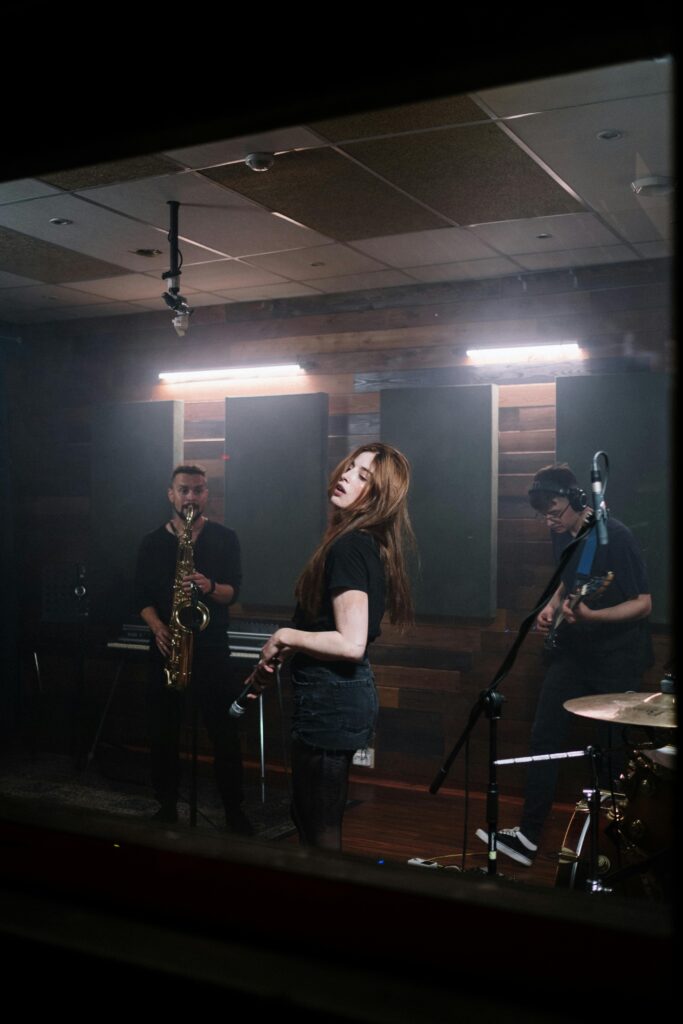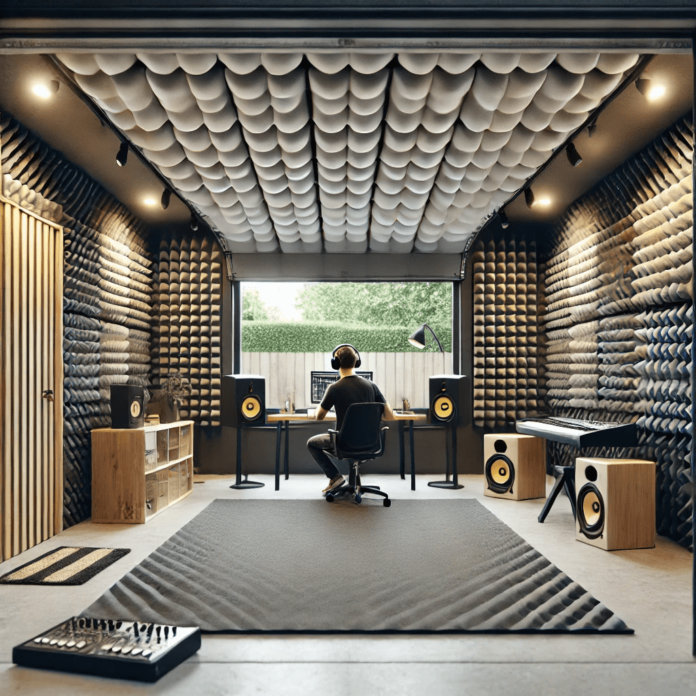Introduction
- Understanding Noise Transmission
- Assessing Your Soundproofing Needs
- Soundproofing Materials and Tools
- Insulating Garage Walls
- Soundproofing the Garage Door
- Reducing Noise Through Windows
- Treating the Ceiling and Floor
- Sealing Gaps and Cracks
- Creating a Floating Room
- Soundproofing for Specific Projects
- DIY Soundproofing Tips
- Professional Soundproofing Services
- Maintaining Your Soundproof Garage
- How to Create a Soundproof Garage for Noise-Free Home Projects
- Conclusion
- FAQs
Transforming your space into a soundproof garage is essential if you’re using it for home projects, music, or other noisy activities. With the right garage soundproofing tips, you can reduce noise, enhance privacy, and create a comfortable workspace. Whether you’re planning on soundproofing a garage for DIY tasks or as a music studio, techniques like sealing gaps, insulating walls, and using acoustic panels can make a big difference. This guide covers everything you need to know to soundproof your garage effectively and keep the peace.
A garage can be a noisy space, especially when it doubles as a workshop, music studio, or DIY project zone. The sound of power tools, instruments, or machinery can easily disturb family members or neighbors. Learning how to soundproof your garage ensures that you can work in peace while keeping the noise contained. Here’s a step-by-step guide to creating a quiet and productive garage space.
Understanding Noise Transmission
Sound travels through walls, doors, windows, and floors, often escaping through weak points in your garage’s structure.
- Walls and Doors: Thin materials like standard drywall or hollow doors let sound pass through easily.
- Windows: Glass panes amplify sound transmission if not treated.
- Floors and Ceilings: Hard surfaces like concrete and wood reflect noise, increasing its intensity.
Assessing Your Soundproofing Needs
Before starting, determine your specific requirements:
- Type of Noise: Loud tools and machinery require heavy-duty soundproofing, while music studios may focus on acoustics.
- Current Setup: Evaluate the garage’s insulation, door quality, and wall thickness to identify weak spots.
Soundproofing Materials and Tools
Invest in quality materials for effective soundproofing:
- Acoustic Panels and Foam: Absorb sound waves and reduce echo.
- Soundproof Curtains: Block noise from escaping through windows or doors.
- Green Glue: A damping compound minimizes vibrations by acting as a buffer between layers of drywall, reducing noise effectively.
Insulating Garage Walls
Walls frequently serve as the primary pathways for noise to travel, contributing significantly to sound transmission. Soundproof them with:
- Fiberglass or Foam Insulation: Fill the wall cavities to dampen noise.
- Soundproof Drywall: Replace standard drywall with thicker, sound-resistant panels.
- Seal Cracks: Use acoustic caulk to seal gaps around outlets and joints.
Soundproofing the Garage Door
Garage doors can be a major source of noise leakage:
- Insulation Kits: Attach foam panels to reduce noise and temperature fluctuations.
- Weatherstripping: Seal the edges of the door to block sound escape.
- Soundproof Blankets: Hang heavy blankets over the door for extra dampening.
Reducing Noise Through Windows
Windows can amplify and transmit sound:
- Double-Pane or Acoustic Windows: Replace standard glass with sound-resistant options.
- Soundproof Curtains: Add thick, noise-blocking curtains to cover window areas.
- Window Plugs: Create temporary plugs with foam or wood to seal windows during noisy activities.
Treating the Ceiling and Floor
Floors and ceilings are key elements in effective soundproofing, as they significantly impact noise reduction and containment:
- Acoustic Tiles: Attach sound-absorbing tiles to the ceiling.
- Floor Mats or Carpets: Use thick mats or rugs to absorb vibrations and reduce echo.
- Resilient Channels: Install channels to separate the ceiling from the joists, minimizing sound transfer.
Sealing Gaps and Cracks
Even small gaps can let sound escape:
- Acoustic Caulk: Fill gaps around outlets, baseboards, and fixtures.
- Door Seals: Install door sweeps and weatherstripping for an airtight seal.
Creating a Floating Room
For maximum soundproofing, consider building a floating room:
- Decoupled Walls: Use resilient clips or channels to separate wall layers.
- Room-Within-a-Room: Create an inner structure insulated from the outer garage walls.
Soundproofing for Specific Projects
Tailor your soundproofing approach to your activities:
- Workshops: Use heavy-duty insulation to handle machinery noise.
- Music Studios: Add bass traps and diffusers for better acoustics.
- Recording Spaces: Focus on eliminating echo with foam panels and rugs.
DIY Soundproofing Tips
For affordable and temporary solutions:
- Use Rugs and Blankets: Lay down thick rugs or hang blankets on walls.
- Repurpose Household Items: Old mattresses or cushions can help absorb sound.
- Window Fans: Use fans to reduce noise reflections and cool the space.
Professional Soundproofing Services
For larger projects or advanced setups:
- Hire Experts: Professionals can install advanced systems for maximum sound reduction.
- Costs: While pricier, expert installation ensures long-term effectiveness.
Maintaining Your Soundproof Garage
To keep your soundproofing effective:
- Inspect Regularly: Check for wear and tear on seals, panels, and insulation.
- Upgrade When Needed: Replace outdated materials for better results.
- Clean Often: Dust and debris can reduce the effectiveness of acoustic materials.
How to Create a Soundproof Garage for Noise-Free Home Projects

A soundproof garage can make all the difference when working on noisy home projects or using your garage as a music studio. Here are some essential steps:
- Insulate the Walls: Install fiberglass or foam insulation to reduce noise transfer and enhance acoustic performance.
- Seal Gaps and Cracks: Use acoustic caulk to seal gaps around windows, doors, and outlets, ensuring minimal sound escape.
- Add Acoustic Panels: Place sound-absorbing panels on walls and ceilings to dampen echoes and vibrations.
- Soundproof the Door: Use insulation kits or heavy blankets to reduce noise leakage through the garage door.
Conclusion
Soundproofing your garage is a worthwhile investment, especially if you use it for home projects, music, or workshops. By identifying weak points and using effective materials, you can create a quiet, productive space while minimizing disruption to others. Start with small upgrades or consider professional services to achieve the perfect soundproof garage.
FAQs
How much does it cost to soundproof a garage?
Costs range from $500 for DIY methods to $5,000 or more for professional-grade soundproofing.
Can I soundproof my garage on a budget?
Absolutely! Rugs, blankets, and acoustic caulk provide budget-friendly solutions for minimizing noise and enhancing soundproofing.
Which material is best for soundproofing a garage?
Acoustic foam, soundproof drywall, and fiberglass insulation are highly effective options.
How long does soundproofing last?
With proper maintenance, soundproofing materials can last for many years.
Do I need professional help to soundproof a garage?
While DIY methods work for basic needs, professionals are recommended for large-scale or advanced soundproofing projects.














